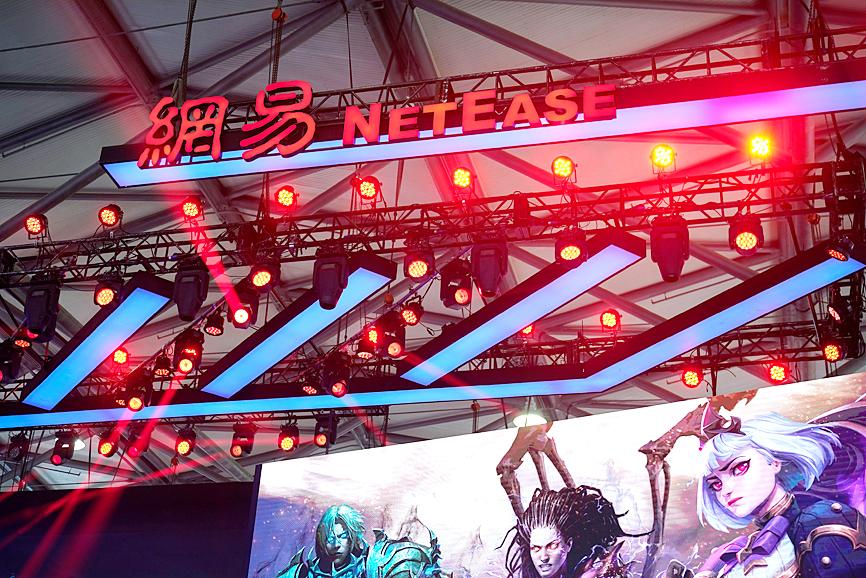Cloud Village Inc, the music streaming arm of Chinese gaming giant NetEase Inc (網易), is postponing the launch of a Hong Kong initial public offering (IPO) that was set to raise about US$1 billion, people familiar with the matter have said.
The unit tested demand for its offering last week, but is not going ahead with taking investor orders, the people said, asking not to be identified as the information is not public.
It intends to wait for better market conditions, one of the people said.

Photo: Reuters
At an expected size of about US$1 billion, Cloud Village’s IPO would be one of the biggest potential first-time share sales in Hong Kong by a technology company this year.
IFR first reported the delay yesterday. A representative for the company did not immediately respond to requests for comment.
A widening campaign by Beijing to rein in its tech and Internet sectors has spurred a sharp sell-off in Chinese technology giants from Tencent Holdings Ltd (騰訊) to Kuaishou Technology (快手).
The regulatory onslaught at one point wiped out more than US$1 trillion of market value from Chinese stocks.
Since the start of last month, Hong Kong’s Hang Seng Tech Index has shed 18 percent, while the NASDAQ Golden Dragon Index, which tracks US-listed Chinese companies, has declined 24 percent in the same period.
Cloud Village’s parent NetEase was also swept up in the selling after Chinese state media criticized the games industry, leading investors to look for the firms next in line for scrutiny.
The gaming company’s Hong Kong shares pared recent losses yesterday, advancing as much as 4.7 percent after the Cloud Village news. They have fallen about 9 percent since July 30.
Listings in the territory have slowed down sharply in the past month, due to the rocky markets as well as the usual summer lull.
Chinese electric vehicle maker Li Auto Inc (理想汽車) raised US$1.5 billion in a dual primary listing last week, but other than that there have been no major offerings since June.
The Chinese government’s efforts have resulted in most, if not all, planned US IPOs by mainland firms being put on hold. Last month, Beijing proposed new rules increasing its supervision of overseas IPOs in a move aimed at safeguarding data security.
A number of companies, like on-demand logistics and delivery firm Lalamove (貨拉拉), are considering shifting their IPOs to Hong Kong given the increasing oversight, Bloomberg News reported.
TikTok owner ByteDance Ltd (字節跳動) is reviving plans to list in Hong Kong by early next year even as Chinese authorities widen their crackdown on the country’s technology companies, the Financial Times reported.
The listing could take place either next quarter or in early next year, the paper said in a report on Sunday, citing three unidentified people with knowledge of the plans.
ByteDance has been working on addressing data security concerns raised by Chinese regulators, the paper reported.
It is going through a review process and has submitted filings to Chinese authorities, and final guidance is expected from ByteDance by next month, one of the people was cited as saying.

Taiwan Semiconductor Manufacturing Co (TSMC, 台積電) secured a record 70.2 percent share of the global foundry business in the second quarter, up from 67.6 percent the previous quarter, and continued widening its lead over second-placed Samsung Electronics Co, TrendForce Corp (集邦科技) said on Monday. TSMC posted US$30.24 billion in sales in the April-to-June period, up 18.5 percent from the previous quarter, driven by major smartphone customers entering their ramp-up cycle and robust demand for artificial intelligence chips, laptops and PCs, which boosted wafer shipments and average selling prices, TrendForce said in a report. Samsung’s sales also grew in the second quarter, up

LIMITED IMPACT: Investor confidence was likely sustained by its relatively small exposure to the Chinese market, as only less advanced chips are made in Nanjing Taiwan Semiconductor Manufacturing Co (TSMC, 台積電) saw its stock price close steady yesterday in a sign that the loss of the validated end user (VEU) status for its Nanjing, China, fab should have a mild impact on the world’s biggest contract chipmaker financially and technologically. Media reports about the waiver loss sent TSMC down 1.29 percent during the early trading session yesterday, but the stock soon regained strength and ended at NT$1,160, unchanged from Tuesday. Investors’ confidence in TSMC was likely built on its relatively small exposure to the Chinese market, as Chinese customers contributed about 9 percent to TSMC’s revenue last

LOOPHOLES: The move is to end a break that was aiding foreign producers without any similar benefit for US manufacturers, the US Department of Commerce said US President Donald Trump’s administration would make it harder for Samsung Electronics Co and SK Hynix Inc to ship critical equipment to their chipmaking operations in China, dealing a potential blow to the companies’ production in the world’s largest semiconductor market. The US Department of Commerce in a notice published on Friday said that it was revoking waivers for Samsung and SK Hynix to use US technologies in their Chinese operations. The companies had been operating in China under regulations that allow them to import chipmaking equipment without applying for a new license each time. The move would revise what is known

UNCERTAINTY: A final ruling against the president’s tariffs would upend his trade deals and force the government to content with billions of dollars in refunds The legal fight over US President Donald Trump’s global tariffs is deepening after a federal appeals court ruled the levies were issued illegally under an emergency law, extending the chaos in global trade. A 7-4 decision by a panel of judges on Friday was a major setback for Trump, even as it gives both sides something to boast about. The majority upheld a May ruling by the Court of International Trade that the tariffs were illegal. However, the judges left the levies intact while the case proceeds, as Trump had requested, and suggested that any injunction could potentially be narrowed to apply